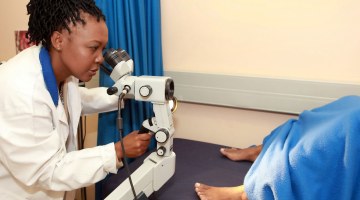via AllAfrica.com, by Julie Frederikse
 Africans tracking the worldwide HIV epidemic have not found much to celebrate since Aids began ravaging the continent 30 years ago, but researchers are optimistic that they are learning as much from their failures as their successes.
Africans tracking the worldwide HIV epidemic have not found much to celebrate since Aids began ravaging the continent 30 years ago, but researchers are optimistic that they are learning as much from their failures as their successes.
Take the case of a husband and wife team from the University of KwaZulu-Natal in South Africa. Professors Salim Karim and Quarraisha Abdool Karim head up a research unit that has been at the forefront of clinical trials to find a safe and effective microbicide to protect women from HIV.
In July 2010, delegates at the last World Aids conference gave the couple a standing ovation when they announced the results of one of the most promising studies on HIV prevention to date. Their team at the Centre for the Aids Program of Research in South Africa (Caprisa), showed that a vaginal gel called tenofovir was able to reduce sexual transmission of the virus by 39 percent overall and 54 percent in women who used it consistently.
But the euphoria over this breakthrough has dissolved into disappointment, with the unexpected finding of a wider sub-Saharan African study that the microbicidal gel, when prescribed daily, does not prevent HIV infections. This has led to the suspension of tenofovir in the Vaginal and Oral Interventions to Control the Epidemic (Voice) trial.
Tenofovir is an antiretroviral drug that is taken successfully by many people living with Aids to suppress the virus. The hope had been that tenofovir could also be used to prevent HIV infection. Women are twice as likely as their male partners to acquire HIV during sex and account for 60 percent of adult HIV infections in sub-Saharan Africa. An effective microbicide would give women the option of applying the vaginal gel themselves before sex, without necessarily informing their partners.
Read the rest.
[Content that is linked from other sources is for informational purposes and should not construe a Mapping Pathways position.]
 Africans tracking the worldwide HIV epidemic have not found much to celebrate since Aids began ravaging the continent 30 years ago, but researchers are optimistic that they are learning as much from their failures as their successes.
Africans tracking the worldwide HIV epidemic have not found much to celebrate since Aids began ravaging the continent 30 years ago, but researchers are optimistic that they are learning as much from their failures as their successes.Sub-Saharan Africa still carries the biggest burden of HIV worldwide, and while there has been a significant improvement in access to antiretroviral treatment in recent years, scientists searching for a gel or vaccine that can prevent HIV infection ride a rollercoaster of hope and disappointment.
Take the case of a husband and wife team from the University of KwaZulu-Natal in South Africa. Professors Salim Karim and Quarraisha Abdool Karim head up a research unit that has been at the forefront of clinical trials to find a safe and effective microbicide to protect women from HIV.
In July 2010, delegates at the last World Aids conference gave the couple a standing ovation when they announced the results of one of the most promising studies on HIV prevention to date. Their team at the Centre for the Aids Program of Research in South Africa (Caprisa), showed that a vaginal gel called tenofovir was able to reduce sexual transmission of the virus by 39 percent overall and 54 percent in women who used it consistently.
But the euphoria over this breakthrough has dissolved into disappointment, with the unexpected finding of a wider sub-Saharan African study that the microbicidal gel, when prescribed daily, does not prevent HIV infections. This has led to the suspension of tenofovir in the Vaginal and Oral Interventions to Control the Epidemic (Voice) trial.
Tenofovir is an antiretroviral drug that is taken successfully by many people living with Aids to suppress the virus. The hope had been that tenofovir could also be used to prevent HIV infection. Women are twice as likely as their male partners to acquire HIV during sex and account for 60 percent of adult HIV infections in sub-Saharan Africa. An effective microbicide would give women the option of applying the vaginal gel themselves before sex, without necessarily informing their partners.
Read the rest.
[Content that is linked from other sources is for informational purposes and should not construe a Mapping Pathways position.]

No comments:
Post a Comment